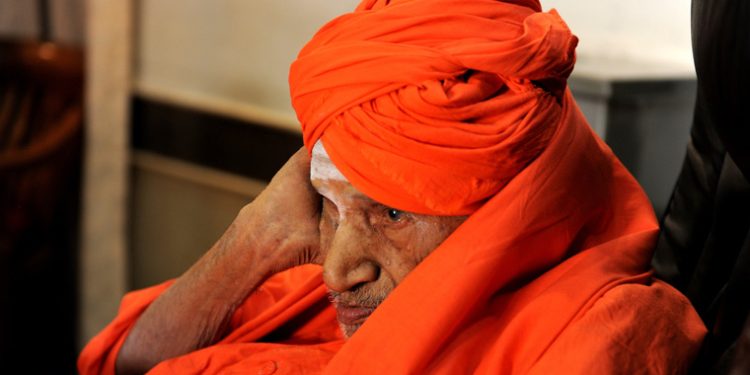Chief Minister Basavaraj Bommai on Friday promised to send a fresh proposal to the Centre recommending the posthumous award of the Bharat Ratna, the country’s highest civilian award, to centenarian seer Sri Shivakumara Swami of Siddaganga Mutt, after discussion with the top leadership.
Who is Shivakumara Swami?
Sree Siddaganga Matha (also called Siddaganga Kshetra) is a Lingayat matha with an attached educational institution. The matha was established by Sri Haradanahally Gosala Siddeshwara Swamigalu in the 15th century in a village in the southern state of Karnataka, India. It is located in the Tumkur taluk of Tumkur district in Karnataka.
Shivakumara Swami was an Indian Spiritual leader and Humanitarian. He was the head of the Siddaganga Matha in Karnataka, India and was the founder of Sri Siddaganga Education Society. Swamiji is considered the most respected adherent Lingayatism, a sect of Shaivism in Hindu Religion.
Shivakumara Swami was born on 1 April 1907 (Age: 111 years, 295 days in January 2019) in Veerapura, a village near Magadi in the Kingdom of Mysore (now, in Karnataka). His childhood name was Shivanna. When he was eight years old, his mother passed away. He completed his primary education in an Anglo-vernacular school in Nagavalli, a village in present-day Tumkur district, Karnataka. In 1926, he passed his matriculation. Meanwhile, he was also a student at Siddaganga Matha (or Mutt) at Tumkur district in Karnataka. For his higher education, he enrolled at Central College of Bangalore to study art and science. He had to drop out of his college, as, he was named the successor of Uddana Shivayogi Swami to head the Siddaganga Matha (or Mutt).
Former President of India, A. P. J. Abdul Kalam also visited Swamiji at Tumkur and hailed the humanitarian and social works of Swamiji.
In 1930, when he was doing his graduation, he was chosen the head of Siddaganga Matha or Mutt but did not hold the position until the death of the incumbent head, Shivayogi Swami in 1941. On that occasion, he changed his name from Shivanna to Shivakumara. In the same year on 3 March, he entered the monk order, ‘viraktashram’ and assumed a pontifical name, Shivkumara Swami.
Throughout his life, Swami laid the foundation of 132 educational institutes. By his philanthropic works, he was respected by all communities. People from all religions, castes, and creeds were helped by his philanthropic activities. He also established some shelter houses and provided food for the poor. In 2007, the Government of Karnataka praised his works and celebrated the centennial birth anniversary of Swamiji. Former President of India, A. P. J. Abdul Kalam also visited Swamiji at Tumkur and hailed the humanitarian and social works of Swamiji.
In 2007, Swamiji was given the Karnataka Ratna, the highest civilian award in the state of Karnataka. In 2015, the Government of India bestowed him upon the third highest civilian award of the country, Padma Bhushan.
Speaking to reporters after taking part in a ‘Dasoha Dina’ programme to commemorate the third death anniversary of the seer, Chief Minister Basavaraj Bommai asserted that he will tread the path of the swamiji. The ‘walking god’ was instrumental in ensuring free food, shelter and education for the weaker sections of society through various charity institutions of the mutt.



















Discussion about this post